De Turkse schrijver Sait Faik Abasıyanık werd geboren op 23 november 1906 in Adapazarı. Zie ook alle tags voor Sait Faik Abasıyanık op dit blog en ook mijn blog van 23 november 2010.
Uit: Simit with Tea (Vertaald door Hatice Orun Ozturk)
“Once again, on the streets of Istanbul. If you are a clerk, papers, if you are a writer, stories, if you are a worker, looms and if you are without a job, parks wait for you.
Everything finds its taste and takes its first step with the smell of the tea infused in you and the sesame seed between your teeth on a day when the rain is going through you.
Now it is time for the aged cheese: Suppose that we got up in the morning in a good mood. We checked our pockets and saw that we could sacrifice a twenty-five.
-Give me 25 kurus worth of cheese! Make sure it is well aged, will you?
An incredible feast awaits you on the marble counter of the coffeehouse. What is this yellow block laying flat on the grocer’s paper, this blonde thing? Is it aged cheese or baklava with many layers? Could this be a woman full of desire reclining before me? Here are two freshly baked simits you can’t bear to break apart. Here is Acem Hasan Efendi’s tulip tea cup with red fingerprints.
Here are the sesame seed crumbs. Place your hand next to the marble counter and fill your palm with them. Toss them into your mouth! Then, rip a small piece from your matchbox to use as a toothpick and as you clean the sesame seeds from your teeth, arrive happily at your work.
The great feast of the morning is over. We can now light up a cigarette.
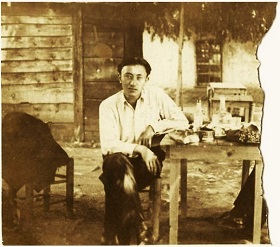
Sait Faik Abasıyanık (23 november 1906 – 11 mei 1954)
De Amerikaanse dichter, schrijver, vertaler, schilder en illustrator Guy Mattison Davenport werd geboren op 23 november 1927 in Anderson, South Carolina. Zie ook alle tags voor Guy Davenport op dit blog en ook mijn blog van 23 november 2010.
Campaign in Thrace
there’s a lost shield
damn the luck
left by that bush with no
two ways about it.
ans some Saian hill-billy
will strut wit hit
but I saved my skin so
to hell with yhe shield
I can get me another
just as good.
Party crasher
you drink a lot of unmixed wine
that you haven’t paid for
and weren’t invited to share
treating everybody as your dearest friend
greed having supplanted any shame
you one had.
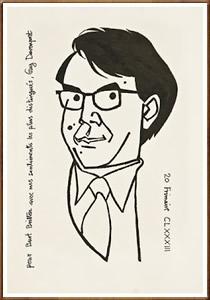
Guy Davenport (23 november 1927 – 4 januari 2005)
Zelfportret, 1983
De Schotse schrijver en historicus Nigel Tranter werd geboren op 23 november 1909 in Glasgow. Zie ook alle tags voor Nigel Tranter op dit blog en ook mijn blog van 23 november 2010.
Uit: The Bruce Trilogy
“My poor house is full, my good lord. With all this of the assize. I can clear a chamber or our lordships, if you will. But … if you would but talk together, for a short time, the chapel is nigh. And empty.”
“The chapel, yes. That will serve. Take us there.” The Prior led them out of a side door and down a cloister walk. At a short distance behind them Bruce’s brothers and Sir Christopher Seton followed on, as did Comyn’s uncle, Sir Robert, and his insman Master William.
Their guide opened another door at the end of the cloister, which proved to be the vestry entrance to the little church, leading directly into the choir.
Gesturing to the others to stay at the door, Comyn beckoned Bruce forward to just before the altar itself. “We may speak safely here,” he said.
A strange place for what falls to pass between you and me!” the other commented.
“As well as another. What have you to tell me, Bruce?”
“Sufficient to prove you a viler scoundrel than I knew defiled the face of this Scotland!”
“Christ God! You dare to speak so!”
“Aye, and more! And speak with good cause. Dastard! Judas!” Comyn’s hand dropped to the jewelled hilt of his dirk. “You will unsay that, Bruce!” he whispered. “No man speaks so to John Comyn, and lives!”
“Unsay it? I will prove it!”
The other’s dagger was half-out of its sheath before he realised that Bruce’s hand was reaching into a pocket, not for his own dirk.
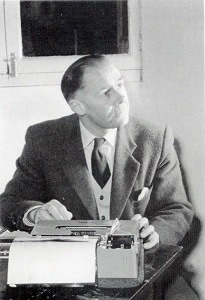
Nigel Tranter (23 november 1909 – 9 januari 2000)
De Duitse schrijfster Marieluise Fleißer werd geboren op 23 november 1901 in Ingolstadt. Zie ook alle tags voor Marieluise Fleißer op dit blog en ook mijn blog van 23 november 2010.
Uit: Abenteuer aus dem Englischen Garten
„Es fing damit an, daß er eine kleine Tonpfeife aus der Tasche zog und sie anrauchte. Die Kinder standen um ihn herum und waren neidisch. Er hieß Willy Sandner. “Ich habe noch neunundzwanzig. Sie sind von einem Matrosen”, sagte er und sah zu Olga hinüber. Olga schaute in die schwarze Öffnung der Garnisonskirche. “Es ist leicht auszudenken,” sagte er, “daß nicht jeder dreißig weiße Pfeifen hat.” Wie unheimlich leer die Kirche immer war, ganz protestantisch. Olga zog die Schultern zusammen. “Protestanten kommen nicht in den Himmel,” sagte sie laut und musterte Erna. Erna wurde dunkelrot.
Sandner sagte: “Ich kann auch welche wegschenken, wenn ich will.” Olga bat nicht. Die Kinder lauerten regungslos nach einer Pfeife.
“Überhaupt tue ich, was mir gefällt,” er lüftete die Lippe ein wenig. Ich dachte, Olga sei dumm, sie hätte sie mir schenken können.
Erna wollte eine haben. “Will vielleicht noch jemand eine?” Er griff in die Tasche, stellte den Kiefer vor, indem er sich bückte. Träumerisch klopfte er die weißen Pfeiflein an seinem Absatz entzwei.
Die Kinder waren gelähmt. Ich höre noch wie heute den Wind in den Kastanien klatschen. Von der Schranne her wehte das Dunkel wie feiner Staub.
Olga zuckte die Achseln. Willy Sandner stand da, als ob er sehr schlecht sei. Erna schimpfte: “Die Rothaarigen kennt man.”
Ich dachte, daß es jetzt Zeit war. Olga sah auch nach der Kirche. Sie sagte, daß er wieder da ist. Alles schrie: “Der Teufel!” und lief davon, was es nur konnte. Olga ging in die Kirche zum Teufel. Aber Sandner ging hinter ihr her. Da sah ich, daß es verpatzt war.“
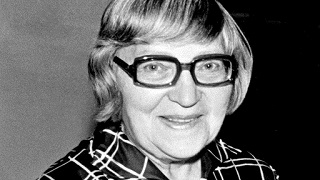
Marieluise Fleißer (23 november 1901 – 2 februari 1974)
De Bengaals-Indische schrijver Nirad C. Chaudhuri werd geboren op 23 november 1897 in Kishoreganj. Zie ook alle tags voor Nirad C. Chaudhuri op dit blog.
Uit:The Autobiography of an Unknown Indian
“But here again the appearances were deceptive, for her face did not show, hardly indicated even, the immense strength of her moral convictions. No one could have inferred from her face that she was capable of such fanaticism as she showed over questions of right and wrong. Even more than my father was she intolerant of demonstrativeness and the wearing of one’s heart on one’s sleeve. If we groaned too much in times of illness or expected to be made much of, we were quietly and firmly told to try to go to sleep instead of making things worse by complaining. Being a highstrung woman she was capable on occasions of turning panicky on some mishap happening to any of her children, but she restrained herself soon, and even in her worst panic she never went anywhere near the normal behaviour of Indian mother on seeing accidents befalling their children. For example, if a one-year-old baby falls down from a height of, say, two feet, the first thing its mother would do would be to give out a hideous scream and begin to knock her head on the floor by way of mourning, on the assumption that the child was already dead and it was no use going to its help. My mother never gave such exhibitions. On the other hand, if we frightened her by giving a scream disproportionate to our injury the chances were that we should be getting some additional cuffing to redress the disproportion. No one who has not observed the behaviour of the little children in India can have an adequate idea of the range of expansion of their mouths in self-pity and hope of external pity. The luxury of self-pity as well as of sympathy was severely rationed in our case. Yet no mother was capable of more business like attendance on her children in sickness.“
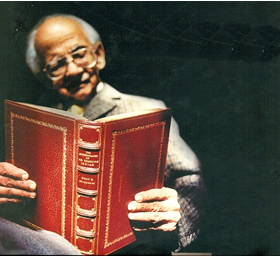
Nirad C. Chaudhuri (23 november 1897 – 1 augustus 1999)
